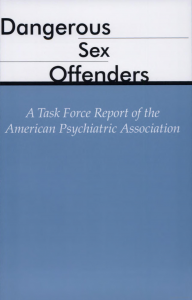
APA’s Board of Trustees approved a task force report on sexually dangerous offenders at its meeting last month in San Diego recommending that psychiatrists vigorously oppose sexual predator laws.
Opposing such laws is necessary “to preserve the moral authority of the profession and ensure continuing societal confidence in the medical model of civil commitment,” states the report.
The report was written by the Task Force on Sexually Dangerous Offenders, a component of APA’s Council on Psychiatry and Law, which endorsed the report before it went to the Board for action.

Paul S. Appelbaum M.D. (Columbia University)
Paul Appelbaum, M.D., was chair of the council when the five-member task force was formed five years ago. Its creation, he noted, was in response to several states’ adopting sexual predator laws allowing sex offenders postincarceration to be civilly committed to psychiatric facilities.
“We were concerned that psychiatry was being used to preventively detain a class of people for whom confinement rather than treatment was the real goal. This struck many people as a misuse of psychiatry.”
The task force agreed, stating in its report that the diagnosis of sexual predator is based on “a vague and circular determination that an offender has a ‘mental abnormality’ that has led to repeat criminal behavior. Thus, these statutes have the effect of defining mental illness in terms of criminal behavior. This is a misuse of psychiatry, because legislators have used psychiatric commitment to effect nonmedical societal ends.”
[perfectpullquote align=”right” bordertop=”false” cite=”” link=”” color=”” class=”” size=””]”We were concerned that psychiatry was being used to preventively detain a class of people for whom confinement rather than treatment was the real goal. This struck many people as a misuse of psychiatry.”— Paul Appelbaum, M.D.[/perfectpullquote]
The task force recommends that societal concerns about protection from dangerous sex offenders be met instead through customary sentencing alternatives within the criminal justice system.
Appelbaum observed that since the U.S. Supreme Court decision last year in the case Kansas v. Hendricks upholding the constitutionality of the Kansas sexual predator law, several states have introduced or passed similar laws.
The purpose of the task force was to assemble information necessary to inform decision making by psychiatrists, legislators, and judges regarding the clinical and ethical implications of sexual predator statutes. The report synthesizes available literature on the diagnoses, treatment, and recidivism of sex offenders, and sexual predator commitment laws including relevant court cases. There is also a section on juvenile sex offenders, frequently asked questions, and a summary of conclusions and policy recommendations.
Appelbaum commented, “The task force report serves as a resource for psychiatrists who want to learn more about sexual disorders and developing treatments and underscores the need for training in psychiatric research programs.”
The report notes that except for a few dedicated researchers and clinicians, most psychiatrists are unfamiliar with the assessment and treatment of sex offenders.
The task force report also presents key findings and recommendations in the following areas:
Diagnosis and Treatment
-
- A significant number of people have paraphilias but only a small percentage receive treatment in either correctional institutions or community settings.
-
- The treatment approach that is most likely to have an effect on recidivism is multimodal, that is, combining pharmacological, cognitive, and behavioral treatments and relapse prevention.
-
- There should be an increased investment in research on paraphilic disorders and in the clinical training of psychiatrists and other mental health professionals regarding assessment and treatment of persons with those disorders.
Treatment Within the Criminal Justice System
-
- Legislatures and correctional agencies should provide therapeutic opportunities for dangerous sex offenders to reduce the rate of recidivism and establish funded programs based on current clinical knowledge.
-
- Sex offenders should be able to participate in treatment programs while serving criminal sentences regardless of whether such participation has any bearing on the nature and length of their sentences. Participation should not be mandatory.
-
- Legislatures interested in developing incentives to encourage sex offenders with paraphilic disorders to participate in treatment should consider special indeterminate sentencing arrangements. Participation should be voluntary and limited to offenders who are clinically suitable.
Chemical Castration Laws
-
- These laws, which predicate release from prison on chemical castration by surgery or antiandrogenic agents for broad classes of sex offenders, are objectionable because they are not based on adequate diagnostic and treatment considerations. They also improperly link medical treatment with punishment and social control.
The Task Force Report on Sexually Dangerous Offenders was written by task force members Howard Zonana, M.D. (chair), Gene Abel, M.D., John Bradford, M.D., Steven K. Hoge, M.D., and Jeffrey Metzer, M.D. Serving as consultants were Judith Becker, Ph.D., Richard Bonnie, LL.B., and Lawrence Fitch, J.D. The report will be published by the American Psychiatric Press Inc. for release next spring.
Source: http://psychnews.org/pnews/98-08-21/civil.html
Pdf of original 1998 press release above
Noteworthy quotes from the 1999 task force report
from doc 19 and 37

“[S]exual predator commitment laws represent a serious assault on the integrity of psychiatry, particularly with regard to defining mental illness and the clinical conditions for compulsory treatment. Moreover, by bending civil commitment to serve essentially non-medical purposes, sexual predator commitment statutes threaten to undermine the legitimacy of the medical model of commitment. … [P]sychiatry must vigorously oppose these statutes, to preserve the moral authority of the profession and to ensure continuing societal confidence in the medical model of civil commitment.”
“…a vague and circular determination that an offender has a ‘mental abnormality’ that has led to repeat criminal behavior. Thus, these statutes have the effect of defining mental illness in terms of criminal behavior. This is a misuse of psychiatry, because legislators have used psychiatric commitment to effect nonmedical societal ends.” American Psychiatric Association Task Force on Sexually
Dangerous Offenders.
—American Psychiatric Association Task Force on Sexually Dangerous Offenders: Dangerous Sex Offenders: A Task
Force Report of the American Psychiatric Association. Washington, DC: American Psychiatric Association, 1999.





Pingback: Organizational Positions Against Pre-Crime Preventative Detention - Just Future Project